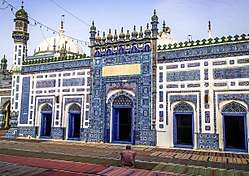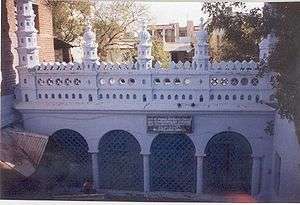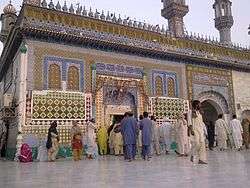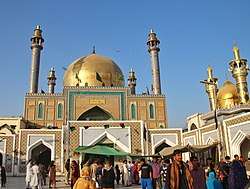Sufism in Pakistan

Sufism has an illustrious history in Pakistan and the greater South Asia region, evolving for over 1,000 years.[1] Today, there are thousands of Sufi shrines and mausoleums which dot the landscape of Pakistan.
Contemporary influence
There are two levels of Sufism in Pakistan. The first is the 'populist' Sufism of the rural population. This level of Sufism involves belief in intercession through saints, veneration of their shrines and forming bonds with a pir (saint). Many rural Pakistani Muslims associate with pirs and seek their intercession.[2] The second level of Sufism in Pakistan is 'intellectual Sufism' which is growing among the urban and educated population. They are influenced by the writings of Sufis such as the medieval theologian al-Ghazali, the Sufi reformer Shaykh Aḥmad Sirhindi and Shah Wali Allah.[3]
Attacks on Sufi shrines
Sufism, a mystical Islamic tradition, has a long history and a large popular following in Pakistan. Popular Sufi culture is centred on Thursday night gatherings at shrines and annual festivals which feature Sufi music and dance. Most Islamic fundamentalists criticise its popular character, which in their view, does not accurately reflect the teachings and practice of the Prophet and his companions.[4][5]
Since March 2005, 209 people have been killed and 560 injured in 29 different terrorist attacks targeting shrines devoted to Sufi saints in Pakistan, according to data compiled by the Center for Islamic Research Collaboration and Learning (CIRCLe).[6] The attacks are generally attributed to banned militant organisations.[7]
The Sehwan Sharif shrine was the site of a suicide bombing in 2017 carried out by the Islamic State.[8]
Sufi Tariqahs


Chishtis
Until this day, both Muslims and non-Muslims visit the famous tomb of Moinuddin Chishti; it has become even a popular tourist and pilgrimage destination. The Ishq-Nuri Tariqa is a contemporary expression and evolution of the traditional Chishti spiritual path, which was founded in Lahore, Pakistan, in the 1960s.
Noorbakshia
Noorbakshia Sufi order is present in the Baltistan region of Gilgit-Baltistan.
See also
References
- ↑ Jafri, Saiyid Zaheer Husain (2006). The Islamic Path: Sufism, Politics, and society in India. New Delhi, India: Konrad Adenauer Foundation.
- ↑ Hussain, Rizwan. Pakistan. The Oxford Encyclopedia of the Islamic World.
Sūfī Islam in Pakistan is represented at two levels. The first is the populist Sufism of the rural masses, associated with unorthodox religious rituals and practices, belief in the intercessory powers of saints, pilgrimage and veneration at their shrines, and a binding spiritual relationship between the shaykh or pir (master) and murīd (disciple). Many Muslims in rural areas of Pakistan, where orthodox Islam has yet to penetrate effectively, identify themselves with some pir, living or dead, and seek his intercession for the solution of their worldly problems and for salvation in the hereafter.
- ↑ Hussain, Rizwan. Pakistan. The Oxford Encyclopedia of the Islamic World.
The other strain is that of scholastic or intellectual Sufism, a recent phenomenon based in urban areas and becoming increasingly popular in educated circles. Influenced by the writings of the medieval theologian al-Ghazālī (d. 1111), the Sūfī reformer Shaykh Aḥmad Sirhindī (d. 1624), and Shāh Walī Allāh (d. 1762), and by the spiritual experiences of the masters of the Suhrawardī and Naqshbandī orders, these modern Sūfīs are rearticulating Islamic metaphysics as an answer to Western materialism.
- ↑ Produced by Charlotte Buchen. "Sufism Under Attack in Pakistan" (video). The New York Times. Retrieved 21 May 2012.
- ↑ Huma Imtiaz; Charlotte Buchen (6 January 2011). "The Islam That Hard-Liners Hate" (blog). The New York Times. Retrieved 21 May 2012.
- ↑ a think-tank based in Rawalpindi
- ↑ Sunni Ittehad Council: Sunni Barelvi activism against Deobandi-Wahhabi terrorism in Pakistan – by Aarish U. Khan Archived 2013-01-23 at the Wayback Machine.| criticalppp.com| Let Us Build Pakistan
- ↑ "At least 100 killed, dozens more injured in blast at Pakistan shrine - police". RT (TV network).
Bibliography
- De Bruijn, The Qalandariyyat in Persian Mystical Poetry from Sana'i, in The Heritage of Sufism, 2003.
- Ashk Dahlén, The Holy Fool in Medieval Islam: The Qalandariyat of Fakhr al-din Araqi, Orientalia Suecana, vol.52, 2004.
- Chopra, R. M., "Great Sufi Poets of the Punjab", 1999, Iran Society, Calcutta.
- Chopra, R. M., "SUFISM" (Origin, Growth, Eclipse, Resurgence), 2016, Anuradha Prakashan, New Delhi, ISBN 978-93-85083-52-5.
External links
- The Islam That Hard-Liners Hate
- Pakistan's Sufis Preach Faith and Ecstasy
- Sufism in Pakistan – the tolerant antidote?
- Mystical Islam 'under threat' in Pakistan
- Steeped in ancient mysticism, the passion of Pakistani Sufis infuriates Taliban
- The Sufis of India and Pakistan
- Sufism and Pakistani society
- Why are they targeting the Sufis?
- /Sufism-in-Punjab/Sufis faced threatening from punjabi Taliban in Punjab
- Difficulties faced by Sufism in Pakistan

